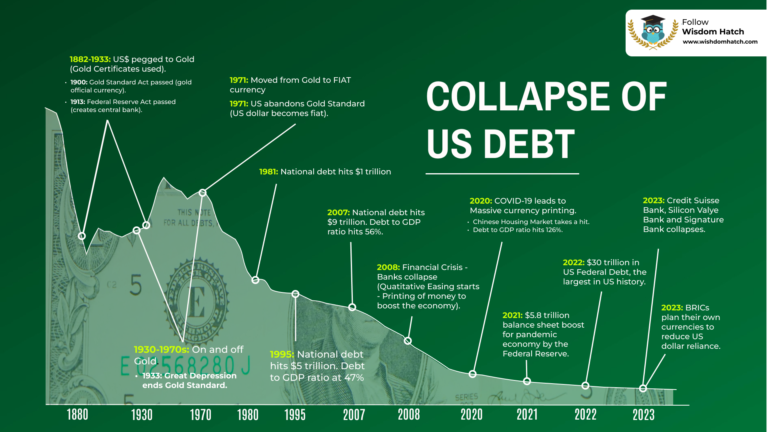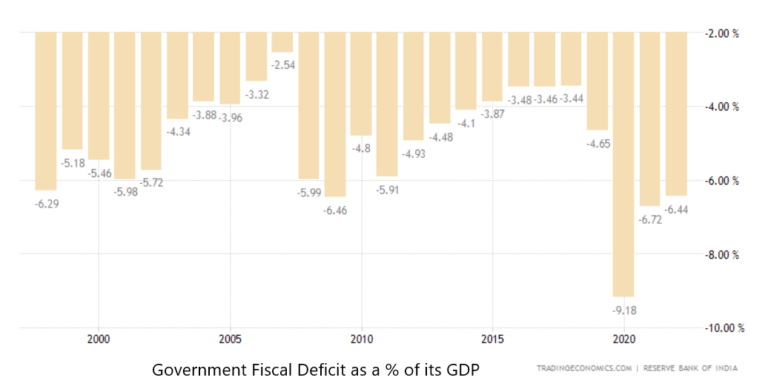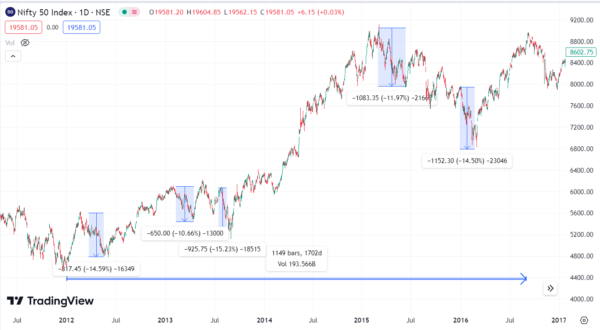US Debt Market Collapse - Impending Crash?

In 2020, the Chinese housing market started to show signs of weakness. In the following year, these seizures reached Europe, where some of the biggest European banks, such as Credit Suisse, started witnessing a collapse. Fast forward to the present, and these signs have spread across the US, resulting in the complete collapse of banks such as the First Republic Bank, Signature Bank, and the Silicon Valley Bank.
So, what triggered this series of events? It simply relates to the US debt market, more specifically due to the record amount of debt that the governments have taken on.

So, the simple question arises: How long can this situation continue?
Fitch, an American Credit Rating Agency, has downgraded the US Debt Market.
Could this initiate a ripple effect on the economy?
Let us begin by breaking down this study into 2 main segments:
- Impact on the Equity Market
- Impact on the Debt Market
Before we delve into the impacts, let’s examine how the stock market has performed over the past 30-40 years.
From the year 1988-2000 (up to the Dot-com bubble, consider this as Phase-1), the stock market gave a return of around 582%. Similarly, from 2009-2020 (consider this as Phase-2), the market gave a return of around 400%. This has created a false notion that if you just invest your money and forget about it, you will naturally make good returns.

Ask yourself a simple question: Why did the market give such a run up in the two scenarios that we mentioned above? The answer could be that during phase 1 this was the period when technology was adopted at a massive scale. Like phase 2, the reason could be the adoption and extensive use of Quantitative Easing by the government (QE in simple words is when the central bank prints extra money to help boost the economy).
To avoid 1930s type of depression, the government decided to opt for the easy method of printing money since it was no longer backed by gold. This method of Quantitative Easing is typically carried out through the Debt Market.
Fitch’s rationale for downgrading the US Debt Market is their belief that the interest rates, current standing at around 6%, will not return to the near-zero levels seen before.

So, what does all this information tell us?
It simply means that it’s HIGHLY possible that the older format of a secular bull run (Long period of bull run) will not continue going forward.
Therefore, it becomes even more crucial for us to educate ourselves than ever before.
With this, let’s jump into the Impact on the Debt Market / Bond Market.
Fitch was not the only one to downgrade the US Debt Market. Back in 2011, S&P had also downgraded the Debt Market from AAA to AA+ just as Fitch did.
Now the immediate question is whether the US Debt Market will be affected. And the answer is most likely YES.

A more important question is whether there will be an impact on the Indian Retail Investors. As mentioned previously, we are likely moving on to a period of higher interest rates (IR will no longer go back down to the near 0% levels).
This will have a direct impact on the Cost of Borrowing in the Bond Markets. This cost will increase in the long run.
Now, does it really matter if the interest rates no longer go down to 0% and stay at somewhere around 3%? YES, there definitely is. Let’s try to understand the gravity of this situation.
Previously, the governments used to be able to borrow at close to 0%. This in turn allowed them to run a Fiscal Deficit within their country (Fiscal Deficit runs when the government spends more than it makes, Expenses > Revenue), This increased expenditure because of the low cost of borrowing allowed them to accelerate the growth within the economy. This helps improve the credit flow in the economy which ultimately pushes the GDP of the country.

This game worked well for the government from 2008 up to 2020. In 2020, the whole world faced an unforeseen event: the COVID outbreak. This forced the government to spend more on critical needs, which pushed the Fiscal Deficits out of proportion.
This outstanding debt will eventually need to be paid over the next few decades, and this is where the cost of borrowing comes into play.

To pay off the debt they have two choices: Increase Taxes (Revenue) which is already very high or reduce Expenses. If let’s say the new interest rates revolve around the 3% mark, they can no longer spend like they used to previously since the cost of borrowing will have gone up substantially. This reduced spending and borrowing could start creating a SLACK in the economy in the long term.
Now, let’s look at how the same situation will Impact the Equity Market.
For this let us rewind back to 2011, when S&P downgraded the US Debt Market. This news was followed by a sharp fall in the stock market and then a subsequent rise over the next few months. Will something like this play out now after the Fitch re-rating? This seems unlikely because of 2 main reasons:
a. One is that since this has happened before, smart investors are better prepared for such a scenario.
b. The second, more fundamental reason has 2 further time lines: a short-term view and a long-term view.
i. From a short-term perspective (less than 2 years):
- In a growth economy there is a clear inverse relation between the bond market and the stock market.
- This can be seen from the period of Oct 21 – Dec 22, where the bond market in India (e.g. : Fixed Deposits) were going up while the stock markets were on a decline.
- So taking this scenario, it is likely that in the SHORT TERM the debt market may go down leading to a rise in Equity Markets.
ii. From a long-term perspective (more than 5 years):
- When the situation arises that companies or governments need to raise capitals, they normally have 2 ways to do so:
a. Bond Market: Taking loans without losing Equity.
b. Equity Market: By selling Equity.
- Now as bond financing gets expensive, there will be a fall in credit flow through the bond market. This in turn increases the value of the Equity Market.
So, does this mean that the Equity Markets will function as they used to? NO, there will be one key difference. They will continue to provide good returns in the long term, but this will be accompanied by a lot of volatility.
Now, what exactly do you mean by Volatility? This can be more easily explained with an example. If you take the period from 2012-2016, the stock market provided good returns. But if you take a closer look, you will see that the markets corrected by more than 10% at least 5 times in the same period. This is what volatility simply means. As the market moves from the current levels in 2023, there will be many such instances of corrections throughout the bull run.

In conclusion, what can we, as Retail Investors, do to make the most out of this situation?
1. Start buying Real Assets:
- This can be Real Estate, Bitcoin etc. It does not really matter what asset you choose as long as it is a real asset.
- I invest in these Real Assets and over time will be diverting a large part of my portfolio to these assets.
2. Prepare for Volatility:
- It won’t be easy watching your portfolio go through big corrections, and this could lead to panic selling.
- Learn advanced investing techniques such as profit booking, hedging and balancing your portfolio etc.
- For investors who are looking for advanced techniques with a focus on better returns, I have a course on Stock Market Investing which covers all the aspects from Fundamental Analysis to key concepts like Macroeconomics and Wealth building.
3. Intelligently Time the Markets:
- People will point out how it is impossible to time the markets, and that Warren Buffet himself has said that it is not possible.
- But he himself sat on a lot of cash during 2021 and deployed it recently.
- So track the markets and learn more on how you can intelligently time your investments to maximize your gains.
4. Book Real Profits:
- Booking real profits gives you more confidence to stay invested in the market.
The US Debt Market is in a precarious situation due to record government debt levels. Fitch downgraded it, raising concerns about its impact on the economy. This could mark the end of a prolonged bull market.
Changing Market Dynamics:
Stock markets saw significant growth during periods of technological adoption and quantitative easing.
Fitch’s downgrade suggests interest rates may not return to near-zero levels.
A long-term secular bull run may not continue, making education about investing crucial.
Impact on Debt Market:
Fitch’s downgrade mirrors a 2011 downgrade by S&P, indicating potential effects on the US Debt Market.
Higher interest rates may lead to increased borrowing costs, affecting governments’ ability to stimulate economic growth.
This shift could create an economic slack in the long term.
Impact on the Equity Market:
Short-term outlook: In growth economies, bond and stock markets may have an inverse relationship.
Long-term outlook: As bond financing becomes expensive, equity markets may gain value but with increased volatility, ie: more frequent and sharp price fluctuations.
Invest in real assets like real estate or Bitcoin.
Prepare for market volatility by learning advanced investing techniques such as hedging and rebalancing.
Consider timing your investments intelligently to maximize gains.
Book real profits to build confidence and stay invested in the market.
If you liked this blog post and found it informative then please check out our other blog post on JIO FINANCE – A MULTIBAGGER STOCK?



